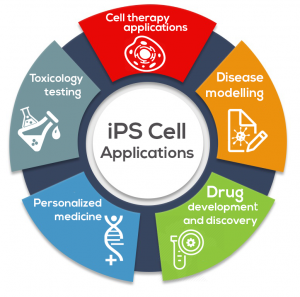Since the discovery of induced pluripotent stem cell (iPSC) technology 15 years ago, significant progress has been made in stem cell biology and regenerative medicine. New pathological mechanisms have been identified, new drugs identified by iPSC screens are in the pipeline, and the first clinical trials employing human iPSC-derived cell types have been initiated.
Today, methods of commercializing iPSCs include:
Cell Therapy: iPSCs are being explored in a diverse range of cell therapy applications for the purpose of reversing injury or disease.
Disease Modelling: By generating iPSCs from patients with disorders of interest and differentiating them into disease-specific cells, iPSCs can effectively create disease models “in a dish.”
Drug Development and Discovery: iPSCs have the potential to transform drug discovery by providing physiologically relevant cells for compound identification, target validation, compound screening, and tool discovery.
Personalized Medicine: The use of techniques such as CRISPR enable precise, directed creation of knock-outs and knock-ins (including single base changes) in many cell types. Pairing iPSCs with genome editing technologies is adding a new dimension to personalized medicine.
Toxicology Testing: iPSCs can be used for toxicology screening, which is the use of stem cells or their derivatives (tissue-specific cells) to assess the safety of compounds or drugs within living cells.

Proliferating Applications for iPSCs
Other applications of iPSCs include their use as research products, as well as their integration into 3D bioprinting, tissue engineering, and increasingly, clean meat production. Plus, technology allowing for the mass-production and differentiation of iPSCs in industrial-scale bioreactors is advancing at breakneck speed, with companies like TreeFrog Therapeutics leading the charge.
In recent years, iPSC-derived cells have increasingly been used within preclinical testing and early stage-stage trials. The first clinical trial using iPSCs started in 2008, and today, that number has surpassed 100 worldwide. Most of these clinical trials do not involve the transplant of iPSCs into humans, but rather, the creation and evaluation of iPSC lines for clinical purposes. Within these trials, iPSC lines are created from specific patient populations to determine if these cell lines could be a good model for a disease of interest.
However, there are companies forging forward with clinical trials involving iPSC-derived cell therapeutics, such as Cynata Therapeutics (and its partner Fujifilm), Healios K.K. (in collaboration with Sumitomo Dainippon Pharma), and Fate Therapeutics.
Other companies involved with the commercialization of iPSC-derived cell therapeutics include:
- Allele Biotechnology and Pharmaceuticals is developing a diabetes drug created from iPSC-derived pancreatic beta cells.
- Aspen Neuroscience is combining stem cell biology and genomics to provide the world’s first autologous induced pluripotent stem cell (iPSC)-derived neuron replacement therapy for Parkinson disease.
- Avery Therapeutics and I Peace, Inc., are collaborating to advance an iPSC-derived cell therapeutic for heart failure. I Peace is generating and supplying GMP-grade iPSCs, while Avery Therapeutics is using them to manufacture its MyCardia™ product.
- Bayer acquired iPSC cell therapy company BlueRock Therapeutics in August 2019. Since May 2021, BlueRock Therapeutics, Fujifilm Cellular Dynamics, and Opsis Therapeutics have had an R&D alliance to develop allogeneic iPSC-derived cell therapies for ocular diseases.
- BlueRock Therapeutics, a subsidiary of Bayer since August 2019, develops iPSC-derived cell therapies to target Parkinson’s disease, heart failure, and ocular diseases.
- Bone Therapeutics has partnered with the U.S. company Implant Therapeutics to develop allogeneic, iPSC-derived MSCs.
- Brooklyn Immuno Therapeutics is developing a set of mesenchymal stem cell (MSC) products, derived from iPSCs, to which it also intends to apply its gene editing technology.
- Century Therapeutics was created in July 2019 by Versant Ventures and Fujifilm to develop iPSC-derived adaptive and innate immune effector cell therapies.
- Citius Pharmaceuticals uses iPSCs from a single-donor dermal fibroblast to create iPSC-derived MSCs (i-MSCs). It has completed the development of an i-MSC Accession Cell Bank (ACB) and is testing and expanding these cells to create an allogeneic cGMP i-MSC Master Cell Bank.
- Cynata Therapeutics manufacturers iPSC-derived MSCs using its proprietary Cymerus™ technology. In partnership with FUJIFILM Corporation, it is clinically testing these cells for the treatment of graft-versus-host disease (GvHD). It is also conducting trials for the treatment of critical limb ischemia (CLI), osteoarthritis (OA), and respiratory failure/distress, including ARDS.
- Cytovia Therapeutics is a biopharma company developing allogeneic “off-the-shelf” gene-edited iNK and CAR (Chimeric Antigen Receptor)-iNK cells derived from iPSCs.
- Exacis Biotherapeutics is a development-stage immuno-oncology company that is developing NK cells from iPSCs (ExaNK™ cells) engineered using mRNA gene-editing technology to resist rejection by the patient’s immune system.
- Fate Therapeutics is developing iPSC-derived NK and CAR-T cells for the treatment of cancer and immune disorders.
- FUJIFILM Cellular Dynamics, Inc. (FCDI) is investing in a $21M cGMP production facility to support its internal cell therapeutics pipeline, as well as serve as a CDMO for iPS cell products.
- Heartseed Inc. is a Japanese biotech company that is developing iPSC-derived cardiomyocytes (HS-001) for the treatment of heart failure. The company is positioned to initiate a phase 1/2 study of this investigational cell therapy in Japan in the second half of 2021.
- Healios K.K., in collaboration with Sumitomo Dainippon Pharma, is undertaking a clinical trial using allogeneic iPSC-derived retinal cells to treat age-related macular degeneration.
- Hebecell is commercializing allogeneic “off-the-shelf” iPSC-derived NK cell therapeutics. The company uses a unique feeder-free 3D-iPSC spheroid platform to produce NK cells. This efficient, scalable and reproducible method could allow nearly unlimited production of iPSC-derived NK cells for the treatment of cancer and other diseases.
- Hopstem Biotechnology is one of the first iPSC cell therapy companies in China and a market leader in iPSC-derived clinical-grade cell products. In June 2021, it partnered with Neurophth Biotechnology to co-develop an iPSC-derived cell therapy for the treatment of ocular diseases. Hopstem has a proprietary neural differentiation platform, as well as a patented iPSC reprogramming method and GMP manufactory and quality systems.
- Implant Therapeutics is engineering iPSC-MSC cells containing FailSafe™ and induced Allogeneic Cell Tolerance (iACT Stealth Cell™) technologies. These iPSC MSC cells are hypo-immunogenic and can be used as ex-vivo gene therapy vehicles.
- I Peace Inc. and Avery Therapeutics are collaborating to advance an iPSC-derived cell therapeutic for heart failure. I Peace is generating GMP-grade iPSCs, while Avery Therapeutics is using them to manufacture its MyCardia™ product. I Peace is able to mass production clinical-grade iPSC lines simultaneously in a single room using a miniaturized plate and robotic technology, and its facility is equipped with a fully-closed automated iPSC manufacturing system that meets the safety standards of the U.S. FDA and Japanese PMDA.
- Jacobio Pharmaceuticals has a strategic investment with US-based Hebecell to develop iPSC-derived NK cells for the treatment of cancer and other diseases.
- Keio University won approval from the the Japanese government in February 2018 for an iPSC trial that involves the treatment of patients with spinal cord injuries (led by Professor Hideyuki Okano).
- Kyoto University Hospital, in partnership with the Center for iPS Cell Research and Application (CiRA), is performing a physician-led study of iPSC-derived dopaminergic progenitors in patients with Parkinson’s disease.
- Neurophth Biotechnology Ltd. is a gene therapy company specializing in AAV-mediated gene therapies for the treatment of ocular diseases. In June 2021, it partnered with Hopstem Biotechnology to develop an iPSC-derived candidate cell product for an agreed upon retinal degenerative disorder.
- Novo Nordisk signed a co-development agreement with Heartseed in mid-2021 that grants it exclusive rights to develop, manufacture, and commercialize HS-001 globally, excluding Japan where Heartseed retained exclusive rights to develop HS-001. HS-001 is an investigational therapy comprised of purified iPSC-derived ventricular cardiomyocytes for the treatment of heart failure.
- Osaka University grafted a sheet of iPS-derived corneal cells into the cornea of a patient with limbal stem cell deficiency, a condition in which corneal stem cells are lost.
- REPROCELL recently launched a “Personal iPS service” in Japan to prepare and store an individual’s iPSCs for the treatment of future illness or injury. Individual’s iPSCs are created from mature cells in their urine or dental pulp, using RNA reprogramming technology. The iPSCs are then stored at two locations in Japan and the U.S.
- RIKEN administered the world’s first iPSC-derived cell therapeutic into a human patient in 2014 when it transplanted an autologous iPSC-RPE cell sheet into a patient with AMD.
- RheinCell Therapeutics GmbH is a developer and manufacturer of GMP-compliant human iPSCs derived from HLA-homozygous, allogeneic umbilical cord blood. In January 2021, the company received GMP certification and Manufacturing Authorization within the EU.
- SCM Lifescience, a South Korean stem cell therapy developer, licensed exclusive rights within Korea for the development, approval, production, and sale of a diabetic cell therapy being developed by Allele Biotechnology and Pharmaceuticals. The $750K deal was signed in July 2021.
- Semma Therapeutics, which was acquired by Vertex Pharmaceuticals for $950 million in late 2019, is developing a treatment for Type 1 diabetes. This treatment consists of cells derived from iPSCs that behave like pancreatic cells.
- Shoreline Biosciences is a biotech company that is developing allogeneic “off-the-shelf” natural killer (NK) and macrophage cellular immunotherapies derived from iPSCs for cancer and other serious diseases.
- Stemson Therapeutics has been developing a therapy for hair loss involving generation of de novo hair follicles.
- TreeFrog Therapeutics has a 13,000 sq ft facility in France for the development and scale-up of its cell therapy manufacturing process that leverages human iPSCs. It plans to develop its own iPSC-derived therapies and support co-development programs.
- The U.S. NIH is undertaking the first U.S. clinical trial of an iPSC-derived therapeutic. Its Phase I/IIa clinical trial will involve 12 patients with advanced-stage geographic atrophy of the eye.
- Vita Therapeutics, a Cambrian Biopharma affiliate, is developing iPSC-derived therapeutics. VTA-100 is an autologous, genetically engineered iPSC-derived therapeutic for the treatment of limb-girdle muscular dystrophy, while VTA-200 is a genetically engineered iPSC-derived hypoimmunogenic treatment for muscular dystrophy.
Of course, there are numerous physician-led studies employing human iPSC-derived cell types that have been undertaken as well, including ones by Keio University, Kyoto University Hospital, Osaka University, and RIKEN.
Within the research products realm, the number of market competitors has surged in recent years, although the following industry stalwarts continue to defend their position as iPSC market leaders: Fujifilm Cellular Dynamics, Inc.(USA/Japan), REPROCELL (Japan), Evotec (Europe), Ncardia (Europe), and Axol Bioscience (Europe).
Finally, the world’s largest research supply companies are also commercializing a plethora of iPSC-related products. Examples of these market leaders include Lonza, BD Biosciences, Thermo Fisher Scientific, Merck, Takara Bio, and others.




















Tell Us What You Think!